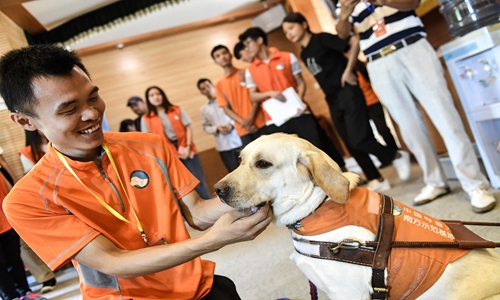Shenzhen to implant all registered dogs with ID microchips
By Wan Lin Source:Global Times Published: 2020/5/31 19:46:06

Seven guide dogs in Guangzhou, South China's Guangdong Province, went into service in September 2017. Photo: VCG
All registered dogs in Shenzhen, a coastal city in South China's Guangdong Province would be implanted with microchips for free, which would be used to help find lost dogs, determine ownership of dogs, and other purposes.
The Urban Administrative and Law Enforcement Bureau in Shenzhen announced on Friday that the city will complete the implantation for all registered dogs by the end of the year. Those without the microchips by then will be categorized as unlicensed dogs, according to Dutenews, a Shenzhen-based news outlet.
Other cities in China have also promoted the use of microchips for dog identification, such as Hangzhou and Ningbo in East China's Zhejiang Province and Southwest China's Chongqing Municipality.
The chip serves as an identity card for dogs, which accurately binds the information on the dogs and their owners, said Yao Yue, manager of Better Lives for Dogs Campaign, World Animal Protection.
Yao told the Global Times on Sunday that a variety of individual identification methods are used for dogs overseas, such as tattoos and ear notching. The microchip is considered the best method as it has the highest accuracy and lasts longest.
Though the microchip is generally more expensive than other methods, Shenzhen will offer free implantation for some 198,000 registered dogs in the city, except for sick dogs, pregnant dogs and puppies less than 3 months old or weighing less than 2 kg, said Feng Zengjun, deputy director of the city's urban administrative and law enforcement bureau.
The implantation work will be carried out in local dog admission centers. To date, three dog admission centers have carried out pilot microchip implantation and everything has gone well, Dutenews reported.
Dogs will have the chip, about the size of a rice grain, injected under the skin in their neck. The chip is covered with material on the surface that helps prevent slip-off and damage and is said to have almost no effect on the dog's health, according to the report.
The whole process takes a few seconds, Li Tuo, a doctor at a Shenzhen-based pet hospital said, noting that the chip can also be taken out if needed.
The chip, with a life span of 15 years, encodes the dog owner's name, contact number, the dog's name and breed.
It can only be accessed by authorized personnel through specialized equipment connected to the department in charge, according to the authorities, thus dismissing concerns over privacy breach issues.
According to the Shenzhen dog management association, the technology helps to better manage dogs in the city and effectively reduce the incidence of injuries they cause.
"The identification of dogs on an individual level will not only help track lost dogs but also hold the owners responsible for whatever they do to the dogs, such as abandoning, mistreating or intentionally hurting them. It offers real protection to dogs," said Yao.
RELATED ARTICLES:
Posted in: SOCIETY